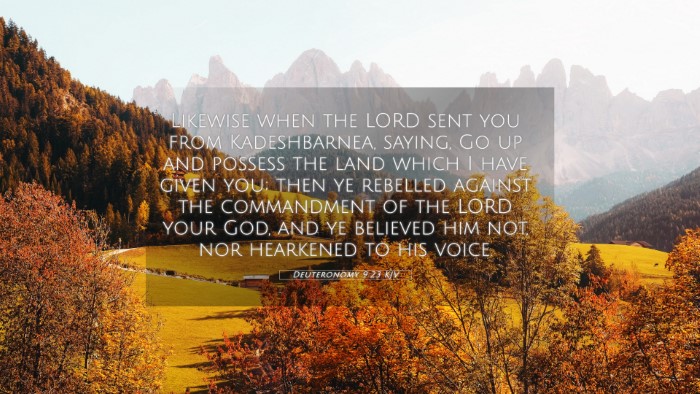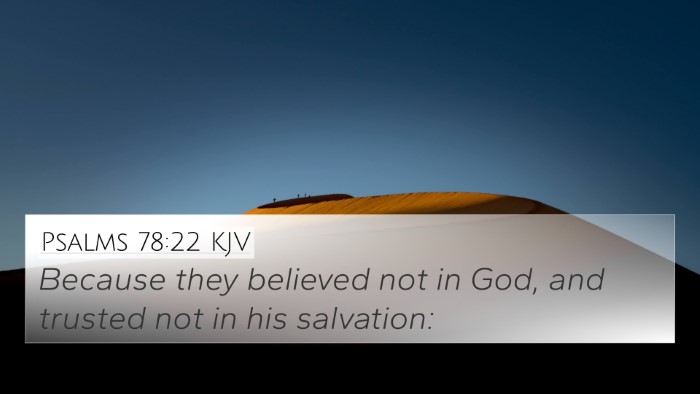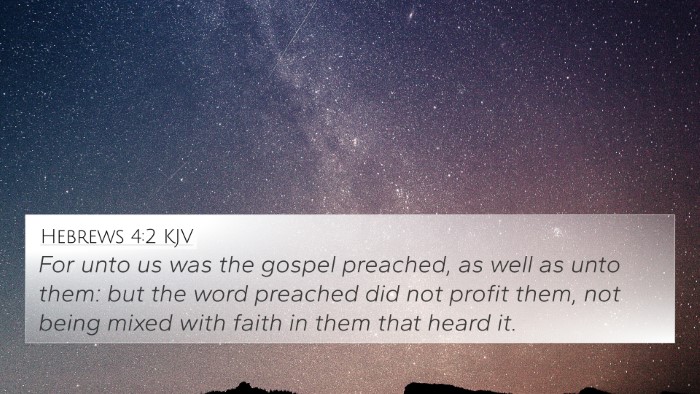Deuteronomy 9:23 - Understanding the Verse
Scripture: "And when the Lord sent you from Kadesh-barnea, saying, Go up and possess the land which I have given you; then you rebelled against the commandment of the Lord your God, and ye believed him not, nor hearkened to his voice."
Summary of Deuteronomy 9:23
This verse captures a significant moment in the history of Israel, reflecting their rebellion against God's command to take possession of the promised land. The refusal to heed God's voice illustrates a theme of unbelief and disobedience that runs throughout the biblical narrative.
Commentary Insights
Matthew Henry's Commentary
Henry emphasizes the tragic stubbornness of the Israelites, who, despite God’s clear command and provision, chose to rebel. This illustrates a broader principle about the human condition, which often inclines towards disbelief despite witnessing divine acts.
Albert Barnes' Notes on the Bible
Barnes highlights the violation of trust in God's promises. This verse exemplifies how doubt can lead to disobedience, stressing the importance of obedience as a response to divine instruction. He connects this disobedience to the historical pattern seen throughout Israel's journey.
Adam Clarke's Commentary
Clarke elaborates on the context of Kadesh-barnea, stating that here was a pivotal point for the Israelites. Their failure to trust God's command not only delayed their entry into the Promised Land but also brought about severe consequences that impacted subsequent generations.
Thematic Connections
The themes present in Deuteronomy 9:23 resonate throughout the Bible, depicting the relationship between divine command and human obedience. The verse serves as a reminder of the consequences of rebellion and the importance of faithfulness to God's word.
Cross-References for Deuteronomy 9:23
- Numbers 14:1-4: The reaction of Israel after hearing the report of the spies highlights their doubt and rebellion.
- Exodus 16:3: This passage discusses the Israelites lamenting their former life in Egypt, demonstrating their hardness of heart.
- Deuteronomy 1:26: This reiterates their refusal to enter the promised land despite God's promise.
- Psalm 95:8-11: Warns against the hardness of heart, referencing Israel's failure in the wilderness.
- Hebrews 3:16-19: Discusses the unbelief of the Israelites and its consequences, linking the Old Testament experience with New Testament teaching.
- Romans 10:21: Illustrates God's persistent call to His people even amidst their rebellion.
- Joshua 1:1-9: God commands Joshua to lead the people into the land, contrasting their previous disobedience.
Tools for Bible Cross-Referencing
For those interested in diving deeper into the connections between Bible verses, the following resources can be quite helpful:
- Bible Concordance: A valuable tool for finding specific words and themes across scripture.
- Bible Cross-Reference Guide: Provides organized references to related verses.
- Cross-Reference Bible Study: Methods and techniques for connecting themes and ideas across scriptures.
Conclusion
Deuteronomy 9:23 serves as a poignant reminder of the consequences of rejecting God's words. It underscores the importance of faith and obedience to divine commands that resonate deeply through scripture. By utilizing tools for cross-referencing, readers can find deeper insights into how various biblical texts relate to each other and enrich their understanding of God's covenant with His people.










